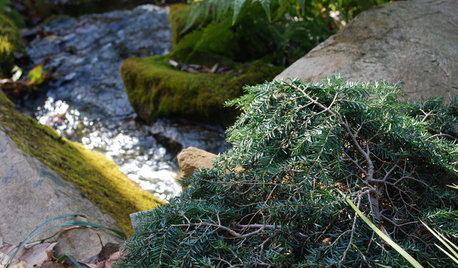Insecticidal properties of some spice oils
anney
14 years ago
Related Stories

COLORPaint Your Bookcases to Transform Your Room
Give your shelves some color for a whole new look. Here are 10 examples, from subtle to bold, and some styling tips to try
Full Story
KITCHEN DESIGNDisplaying Kitchen Supplies — Hot or Not?
Do some kitchens just beg for a cozy row of canisters and gear for all to see? Have a look and let us know what you think
Full Story
KITCHEN DESIGN16 Practical Ideas to Borrow From Professional Kitchens
Restaurant kitchens are designed to function efficiently and safely. Why not adopt some of their tricks in your own home?
Full Story
KITCHEN DESIGNPersonal Style: 50 Clever Real-Life Kitchen Design Details
Get ideas from savvy homeowners who have a knack for creating kitchens celebrating personal style
Full Story
DECORATING GUIDESHow to Get Authentic French Style in Your Home
Move over Shabby Chic and French Provincial. These myths and realities reveal the real look of French decor
Full Story
FEEL-GOOD HOME9 Ways to Boost Your Home’s Appeal for Less Than $75
Whether you’re selling your home or just looking to freshen it up, check out these inexpensive ways to transform it
Full Story
KITCHEN DESIGN9 Questions to Ask When Planning a Kitchen Pantry
Avoid blunders and get the storage space and layout you need by asking these questions before you begin
Full Story
PETSPet-Proofing Your Home: A Room-by-Room Guide
Not all pet dangers are obvious. Keep furry friends safe and sound by handling all of these potential hazards
Full Story
GARDENING GUIDESGreat Design Plant: Tsuga Canadensis ‘Bennett’
Bennett Canadian hemlock thrives in shade and provides sculptural interest in eastern U.S. gardens
Full Story
GARDENING AND LANDSCAPINGBid Bad Garden Bugs Goodbye and Usher In the Good
Give ants their marching orders and send mosquitoes moseying, while creating a garden that draws pollinators and helpful eaters
Full StoryMore Discussions







Kimmsr
Related Professionals
New Bedford Landscape Architects & Landscape Designers · Gainesville Landscape Contractors · Barrington Landscape Contractors · Fairview Landscape Contractors · Rochester Landscape Contractors · Ronkonkoma Landscape Contractors · East Norriton Landscape Contractors · North Aurora Landscape Contractors · Alexandria Decks, Patios & Outdoor Enclosures · Fort Myers Decks, Patios & Outdoor Enclosures · Frisco Decks, Patios & Outdoor Enclosures · Fort Pierce Decks, Patios & Outdoor Enclosures · Hampton Bays Decks, Patios & Outdoor Enclosures · Palmetto Decks, Patios & Outdoor Enclosures · Urbana Decks, Patios & Outdoor Enclosures